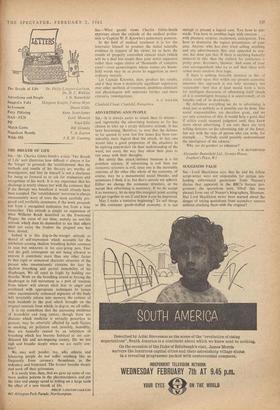The Breath of Life Dr. Philip Langton-Lock ton, Dr. D.
C. Wilkins Advertising and People J. H. Butterfield Suggestio Falsi Margaret Knight. Valerie Myer In Ferment Darsie Gi!lie
Petty Pilfering Anne Scott-James
OAS—FLN Lord Monson PR Nigel Ellis Match Game Bill Grundy Napoleon Brandy T. A. Layton Wilde MS J. E. M. Gunning THE BREATH OF LIFE
SIR,--Mr. Charles Gibbs-Smith's article 'The Breath of Life' well illustrates how difficult it always is for the 'fringe to persuade the 'establishment' that the methods and results of his therapy are worthy of investigation, and that he himself is not a charlatan for being so forward as to ask for evaluation and recognition of his work. It is my experience that his challenge is nearly always met with the comment that if the therapy was beneficial it would already have been accepted. The 'establishment' moreover is always unreasonably wary of even the most carefully pre- pared and ycrifiable statements if the work proceeds not from a recognised institution but from a lone researcher. This attitude is simply an expression of what Wilhelm Reich described as the Emotional Plague, the curse of our time; namely an anti-life . attitude which does its damnedest to see that others shall not enjoy the fredom the plagued one has been denied.
Indeed it is this dog-in-the-manger attitude or • denial of self-expression which accounts for the inhibition causing shallow breathing habits common in man but unknown in his easy-going pets. Fear and the guilt consequent on not being allowed to express it contribute more than any other factor to that rigid or armoured character structure of the person who unconsciously contains his fear by shallow breathing and partial immobility of his diaphragm. We all react to fright by holding our breaths. Work on the breathing aimed at forcing the diaphragm to full movement as a part of 'analysis from below' will always elicit fear or anger and combined with appropriate techniques to loosen other unconsciously armoured segments of the body will invariably release into memory the content of such incidents in The past which brought on the original neurosis from which, in degree, we all suffer.
It is my contention that the increasing incidence of bronchitis and lung cancer,_ though these are diseases which medicine is virtually powerless to prevent, may be adversely affected by such factors as smoking, air pollution and, possibly, humidity; they are basically caused by an inhibition of breathing which has become habitual in our con- ditioned life and sex-negating society. Do we not sigh and breathe deeply when we are really con- tent?
We may well ponder, too, why athletic and labouring people do not suffer anything like so frequently from coronary thrombosis as the sedentary and frustrated. The former breathe deeply and work off their grievances.
It is surely time, then, that we gave up some of our more useless poisons in the pharmacopoeia and put the time and energy saved to testing on a large scale the effect of a new breath of life.
PHILIP LANOTON-LOCKTON
441 Abington Park Parade, Northampton


































 Previous page
Previous page